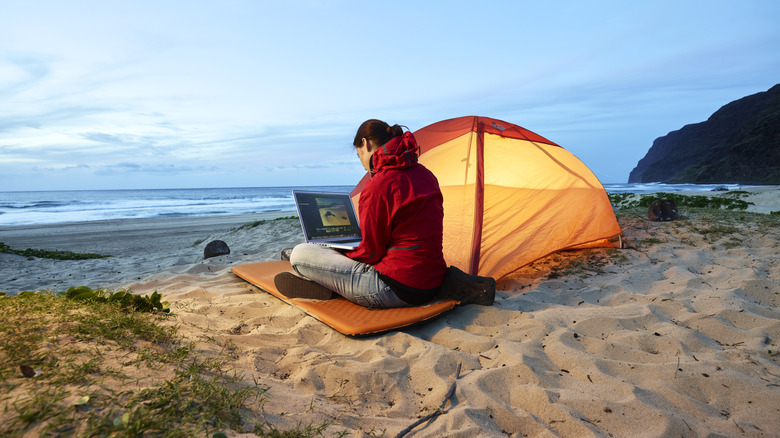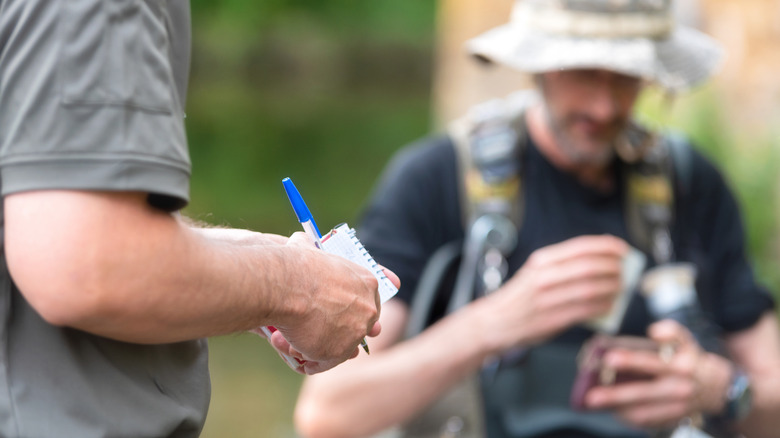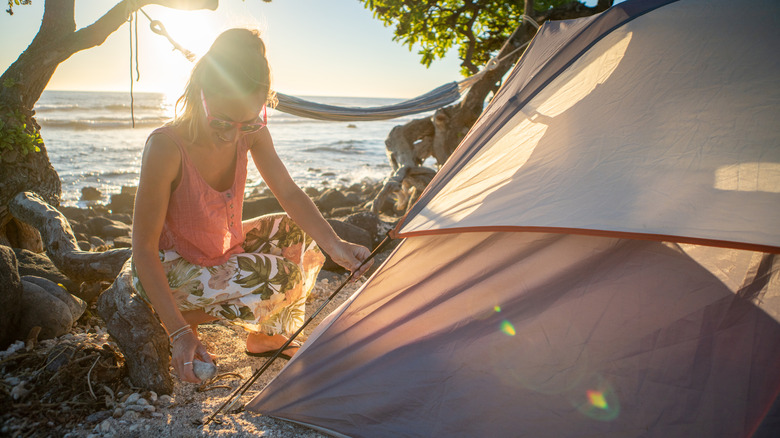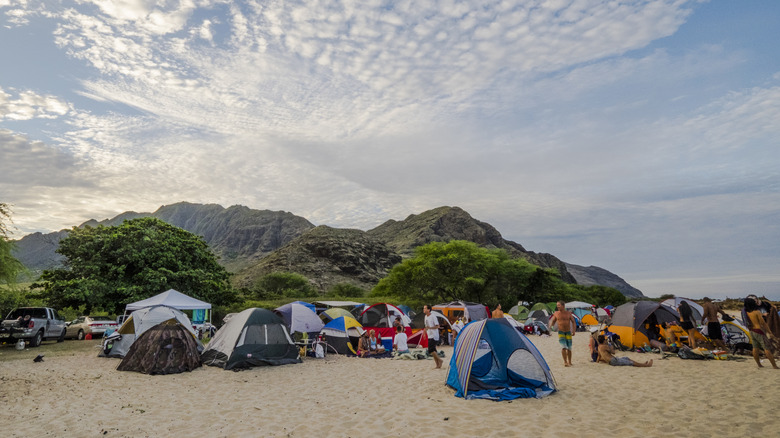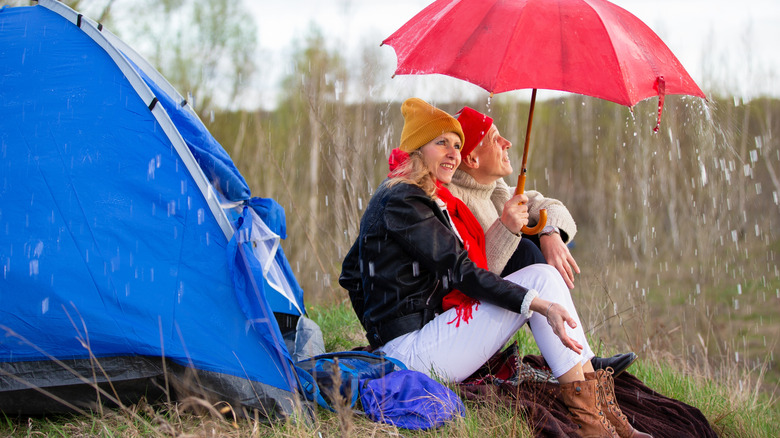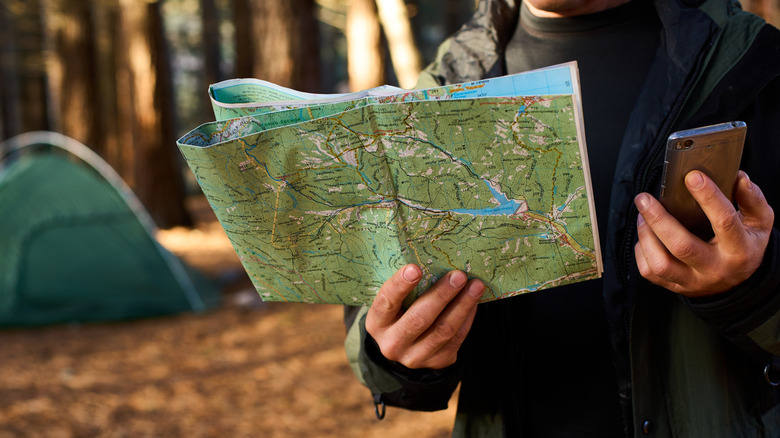Camping In Hawaii Can Save You Tons Of Money, But Here's What You Need To Know Beforehand
Consistently included in lists and rankings of the best beaches in the United States, Hawaii is always a hit among vacationers for its idyllic shores, tropical climate, and natural landscapes that range from volcanoes to rainforests. But if there's one thing that stands in the way between you and your perfect Hawaiian vacation, it's the notoriously high cost of hotel accommodations. Hotel costs climbed to an eye-watering price tag of $364 a night on average in 2024, excluding tax.
Fortunately, beautiful campgrounds across Hawaii provide travelers with the opportunity to fully embrace and connect with the state's natural wonders while saving a hefty sum on costly hotels. Why stick around your hotel when you can be connecting first-hand with the great outdoors? But there's more to camping in Hawaii than throwing items for a quick and easy camping retreat in your backpack and pitching a tent where the day's end finds you — there are rules to take heed of before embarking on your great camping adventure. We're breaking down some insider camping information for you, from pre-arrival permits to essential gear and safety issues along the way.
All camping in Hawaii requires a permit
Camping in Hawaii isn't as straightforward as pitching a tent in a spot of your choosing. Every camper must purchase a permit beforehand, which can be obtained through an online reservation system. Campsites in Hawaii's state parks and counties may vary in terms of comfort and amenities: some have sprawling, well-tended grassy areas and bathroom facilities, while others are much more rugged with basic amenities. If you're looking for an off-the-grid adventure, camping in any of Hawaii's remote forest reserves could be more up your alley, but take note that these reserves are much harder to access (be prepared to hike or rent a four-wheel-drive vehicle) and often have little to no amenities.
Privately owned campgrounds are also an option if you're looking for a unique or niche experience, like pitching your tent in a farm-to-table camp, a working farm, or even a treehouse cannabis garden. In any case, camping in Hawaii can only be done in stretches of five consecutive days at the most, so prepare for alternative accommodations for Wednesdays and Thursdays, when all the campgrounds are closed. Non-locals should expect to pay anywhere from $12 to $30 per night for a public permit.
Arm yourself with proper camping gear
It goes without saying that proper gear can make or break a camping adventure. Hawaii's tropical climate is warm and humid with the occasional rain, so what you need for a solo camping trip varies according to where you're setting up, whether it's among the volcanic landscape of the Big Island, the beaches of Maui, or the lush rainforests of Kauai. Packing lightly but smartly is the rule of thumb, so trim your gear to the essentials. Quick-dry towels, a retractable clothesline, and a waterproof jacket are great complements to a sturdy tent and a sleeping bag or air mattress. Lots of campers swear by a hammock and a tarp, the latter being convenient for draping on the ground or over your tent for extra protection against heavy rains.
Building a fire is strictly prohibited in some campsites unless there are provided grills or fire pits, so bring your own portable cooking gear if you're planning to prepare hot meals. If you're pitching your tent further away from fellow campers, a lantern, headlight, or flashlight will be useful for a nighttime trek to the bathroom. And don't forget the extra batteries. A first aid kit and sunscreen are, needless to say, items to have with you at all times.
Be mindful of camp etiquette and rules
The privilege of being able to camp out in some of the most beautiful natural settings comes with a responsibility to leave the grounds as you found them. A clean campsite elevates the whole camping experience, so maintaining its neatness for the next camper should be your top priority. Trash is a sensitive issue; when left outside, it can attract rodents or even feral pigs, which are known to scavenge campsites. If possible, prepare your food in communal areas to easily discard waste into the appropriate wilderness park bins. If you are in a fairly remote location, keep a fair distance between your cooking or eating area and your tent, and pack food into airtight containers.
There are also strict rules that state parks enforce for all campers, like the banning of drones, generators, or sometimes pets. Smoking, nudity, and alcohol are also prohibited. Be mindful and respectful of your fellow campers by keeping the noise down, especially during the evenings after a long day. Be aware that certain campsites possibly enforce camp curfews, which limit your roaming time outside the camp. Ask beforehand if your camp closes its gates for the evening to avoid being locked out.
Keep checking the weather prior to your camping trip
Sun and rain dominate the Hawaiian islands. Planning a camping trip during the dry season (May through October) gives you warm and sunny days to take advantage of the diverse landscapes and beaches without excessive rainfall, although hurricanes can occur. October through April are the winter months, which bring rain and storms to the islands. But don't let this put you off camping — in addition to balmy temps around 78 degrees Fahrenheit, rain and tropical storms are usually short-lived. Plus, as one Reddit user comments, "the islands will be more lush and green than during the dry season, and many more waterfalls will be present to observe and enjoy."
Whichever island you decide to camp on, you'll be spoiled for choice with a myriad of natural sights and wildlife. Maui is famous for its volcanic terrain, caves, and unique black sand beach in Wai'ānapanapa State Park. If you're planning to hike during the day, Kauai's trails have made a good impression on a lot of travelers. If you're planning on camping in Big Island's Volcanoes National Park, prepare for colder weather. Another Redditor shares, "It can get very cold and wet. I was fine in my waterproof tent with my space blanket but we could hear most of the other campers ditch their tents for their cars when the rain picked up."
Keep your wits about you while camping in Hawaii
While it's easy to succumb to the overwhelming feeling of unwinding and relaxation when camping, don't let your guard down. Even the most seasoned campers can find themselves in unfortunate situations of having their gear stolen — some have experienced an entire tent disappearing. Carry important items like your passport and money with you when you're away from your tent.
It's also sensible to have a travel buddy when camping, especially if you are planning to hike around more remote areas of Hawaii. If you must go alone, keep a mobile phone, whistle, and paper map of the area with you at all times. Letting other campers or camping site staff know where you're going and when you're expecting to return is a good practice in case of any unforeseen accidents or bad weather while venturing off on your own. On that note, checking the weather before going on a solo hike is a good safety tip to follow, given Hawaii's volatile weather.
